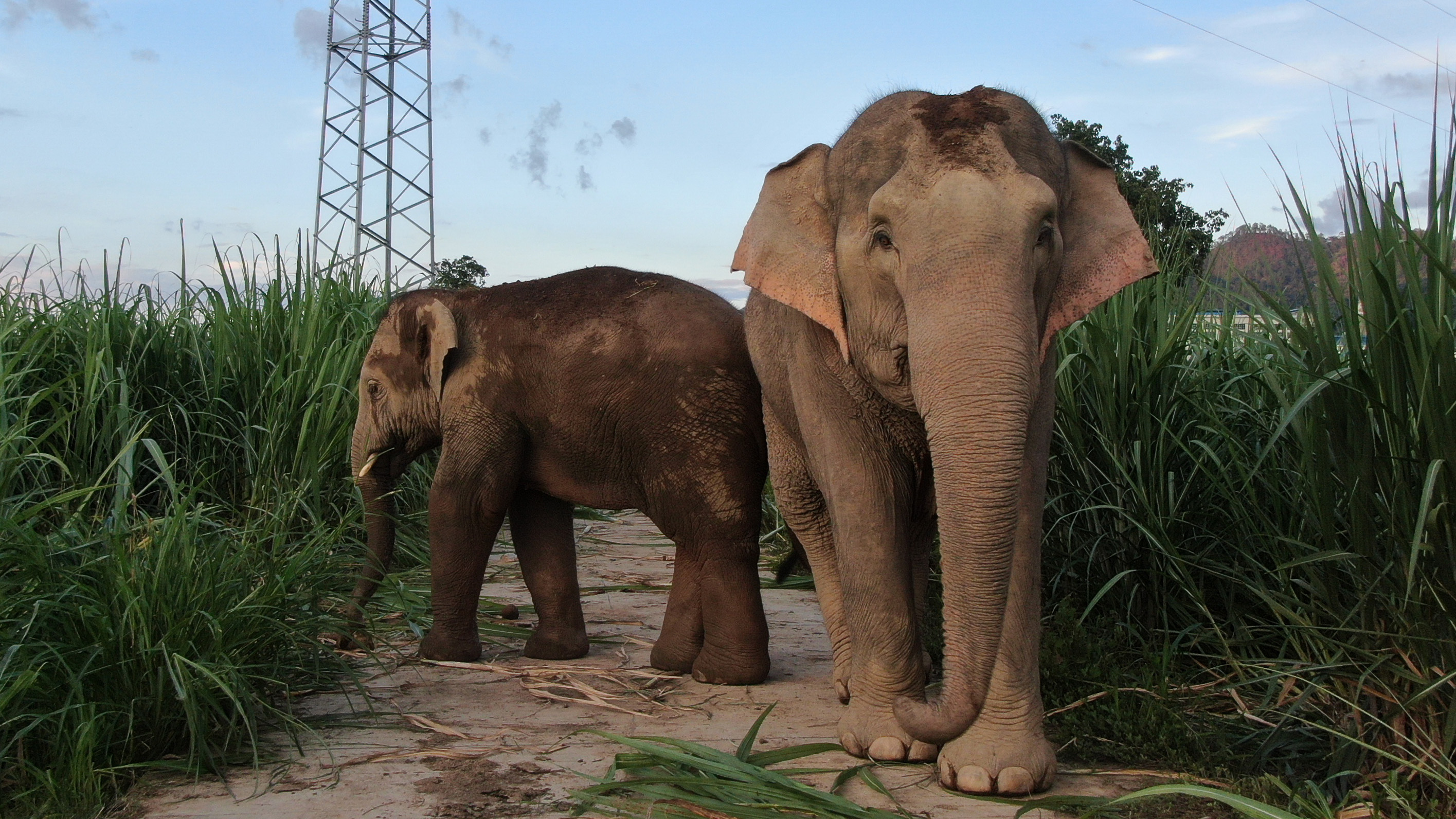Viral story of 'drunk elephants' in China is adorable ... and false. Here's what really happened.
The elephants weren't drunk, just sleepy.

A photo that circulated widely on Twitter in March allegedly showed a pair of Asian elephants in rural southwestern China that had blissfully "passed out" in a tea garden after raiding a village and drinking too much human-made alcohol.
But sometimes, internet stories that seem too good to be true really are too good to be true.
Live Science wrote about the elephants, referencing a tweet by Parveen Kaswan, an Indian Forest Service officer, who said that the elephants "somehow found wine" and were sleeping off their boozy revel. But his tweets about the elephants have since been deleted, and further details about the elephants and the accompanying photos indicate that the story, while charming, was false.
Related: 101 animal shots you'll go wild over
Tweets about the elephants included two images: The photo on the left showed a group of elephants standing in a field, and the photo on the right showed two elephants splayed on their sides, surrounded by tea plants.
While humans carry out social distancing, a group of 14 elephants broke into a village in Yunan province, looking for corn and other food. They ended up drinking 30kg of corn wine and got so drunk that they fell asleep in a nearby tea garden. 😂 pic.twitter.com/ykTCCLLCJuMarch 18, 2020
The story (and photos) of elephants raiding a remote village in Yunnan province and getting drunk, first surfaced on Weibo, the Chinese microblogging platform, Chinese news outlet Xinhua News reported on March 16.
A group of 14 elephants did, in fact, enter several villages in Yunnan province's Menghai County on March 11, damaging roofs and overturning wine jars, according to official reports.
Get the world’s most fascinating discoveries delivered straight to your inbox.
But did the elephants get drunk?
"It was difficult to confirm" if the elephants drank any of the alcohol that they spilled, said Long Yunhai, deputy director of the Forestry and Grassland Bureau of Menghai County, according to Xinhua News
Wild elephants roam around village in Yunnan, southwest China https://t.co/6czxymVhiC pic.twitter.com/HECx9R7W5tMarch 18, 2020
One more elephant incident took place on March 14; nine elephants entered another village, also in Menghai County, where they damaged several buildings and broke solar energy structures. But the viral photos of the so-called drunken elephants were not taken during any of the recent "raids," Yunhai said. In fact, the photo of the elephants in the field previously appeared online on June 19, 2019, in an article about elephant management in China, according to AP News.
"The photo was credited to the Yunnan Province Elephant Management Bureau, which researches elephants. There’s no mention of the elephants being drunk," AP News reported.
That image also accompanied an article published online in December 2019 by the news outlet Huanbao World, about the opening of an Asian elephant research center in Kunming, which is also in Yunnan province.
The photo of the snoozing elephant pair appears to be a still image taken from a drone video; vegetation around the elephants matches that in the photo of the standing group, AP News says. Markings on the "drunk" elephants also match those in the larger group, suggesting that this image was captured at the same time, and does not represent the marauding elephants that were reported in Menghai County in March, according to AP News.
Forestry officials in Yunnan province said that the elephants in the footage were resting, but were not drunk, Xinhua News reported.
- In photos: The most surprising elephant relatives on Earth
- Photos: Seized elephant ivory reveals how massive cartels operate
- Incredible photos capture last glimpse of long-tusked 'elephant queen'
Originally published on Live Science.
OFFER: Save 45% on 'How It Works' 'All About Space' and 'All About History'!
For a limited time, you can take out a digital subscription to any of our best-selling science magazines for just $2.38 per month, or 45% off the standard price for the first three months.

Mindy Weisberger is a science journalist and author of "Rise of the Zombie Bugs: The Surprising Science of Parasitic Mind-Control" (Hopkins Press). She formerly edited for Scholastic and was a channel editor and senior writer for Live Science. She has reported on general science, covering climate change, paleontology, biology and space. Mindy studied film at Columbia University; prior to LS, she produced, wrote and directed media for the American Museum of Natural History in NYC. Her videos about dinosaurs, astrophysics, biodiversity and evolution appear in museums and science centers worldwide, earning awards such as the CINE Golden Eagle and the Communicator Award of Excellence. Her writing has also appeared in Scientific American, The Washington Post, How It Works Magazine and CNN.



